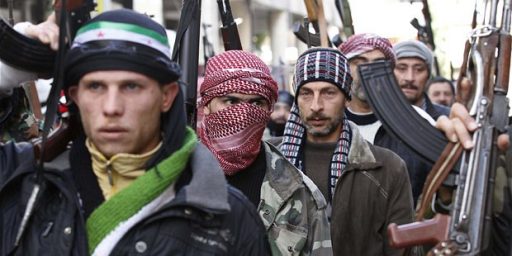One Iman, One Vote
Lee Smith has an interesting piece in Slate entitled, “One Iman, One Vote – What do Islamists mean when they talk about democracy?”
It is a sad, unfortunate fact that liberal constitutionalism has a bad track record in the Arab world. Egypt’s own experiment with it ended in 1952 under circumstances similar to Iraq’s, when Col. Gamal Abdel Nasser led the coup that deposed the king and gutted the 1923 constitution. Given the state of the current-day Iraqi army, the military is not the most serious threat to the new constitution. Then again, neither is the military in a position to defend the secular nature of the state. Indeed, protecting Algeria from Islamic fundamentalists was the reason that country’s military used to cancel the results of the 1992 elections that would have given Islamists the reins, an intervention that resulted in 10 years of civil war and the death of 100,000 people.
As virtually everyone now knows, and apparently few people had considered before the war against Saddam, free elections in Iraq will almost certainly bring Islamists to power. Of course, it’s up to the Iraqis to decide who will lead Iraq. On the other hand, like all nations, the United States has national interests, and it is fanciful to imagine that those interests would be well-served by an Islamist government in Iraq. Moreover, even critics of the U.S. occupation should consider whether democratically elected Islamists would best serve the interests of the Iraqi people.
There is an ongoing debate in the Muslim world, American academia, and now also U.S. policy circles concerning the nature of Islamist democracy. Undoubtedly, Islam is as compatible with democracy as any other religion. But whether democracy comports well with a movement that has in the past advocated jihad and is responsible for thousands of deaths, 1,200 in Egypt alone, is another question entirely. Indeed, some of the Islamist movement’s most influential ideologues have very specifically opposed democracy because it invests political sovereignty in the people—”We, the people”—rather than in God.
Of course, pretty much anyone who’d watched the news since 1979 knew that. Unfortunately, our continued insistence on pretending that the war on terrorism is not a war on Islam–a peaceful religion, after all–has made it difficult to do much about it. The way to stable democracy in an Islamic society is the same as it is in any other volatile society: strong institutions that create checks against extremist impulses. Majoritarian rule is simply unworkable in anything other than an incredibly homogenius society, since it leads to all the cliches about Third World democracy: “One man, one vote, one time.” “An election is a census.”
In Iraq, we simply lacked the political will to have a serious army of occupation which would impose a workable constitution on them. At a minimum, it would have required a very stringent bill of rights to protect religious freedom; strong federalism to give the minority Kurds and Sunnis a major say in governing their own areas; a single member district electoral system to promote centrist parties; and a system with separation of power with checks and balances.






“In Iraq, we simply lacked the political will to have a serious army of occupation which would impose a workable constitution on them.”
Or we had a bunch of incompetent boobs running the whole show who didn’t even listen to their own team’s planning and made mistake after mistake after mistake and are now bugging out because of a certain date in November.
“Political will”? Nice shorthand. 🙂
—